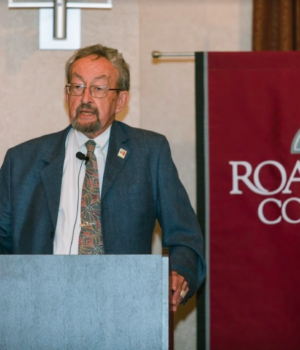Written by Bradley Bommarito
Last Tuesday marked the 14-year anniversary of the U.S. Constitution Day, a federal holiday during which public schools and government offices must provide educational programs to promote a better understanding of the Constitution.
“Some find the requirement that educational institutions celebrate Constitution Day to be controversial, because they assert that it is a form of compelled speech. Nevertheless, I don’t believe that there has been a legal challenge to the law,” said Dr. Todd Peppers, the Henry H. & Trudye H. Fowler Professor of Public Affairs at Roanoke College.
The statutory provision governing Constitution Day is a federal unfunded mandate, meaning government institutions must comply with the directive but are not allocated specific funding in order to do so.
“Regardless of whether it is wise to require academic institutions to celebrate Constitution Day, the Constitution is an important political document and is worthy of celebration and discussion. But it’s critical to remember what the Constitution is. To paraphrase Supreme Court Justice Oliver Wendell Holmes, Jr., the Constitution is an experiment. It is a document written by flawed human beings and born out of negotiation and compromise. There is no guarantee that the Constitution will endure for the ages, and it is important that American citizens read, understand, and challenge the document,” said Peppers.
In recognition of the holiday, RC hosted Stephen L. Wasby, Professor of Political Science at the State University of New York at Albany. Wasby delivered a lecture titled “Accountability Under Law and the Constitution,” where he highlighted the bureaucratic breakdown and judicial disarray that the U.S. government has been experiencing for quite some time now.
“Dr. Wasby provided excellent insight into how judges and justices are held accountable, something that we often don’t think about too often or only think about during senate confirmation hearings. Going into detail on judicial accountability was not only interesting but also timely, giving us more to think about in light of recent events in the news cycle,” said junior Walker Phillips.
Wasby presented an overview of cracks that developed in systems for judicial accountability over the past several decades. Removing federal judges and Supreme Court justices from office is extremely difficult, so by default the confirmation process is the only time during which a nominee’s former words and actions are meaningfully publicly scrutinized. The process has been streamlined by recent executive administrations, resulting in greater possibility for unscrupulous nominees falling through the cracks. Some believe that this is a negative occurrence, considering the relative permanence of federal judiciary appointments.
“The American judicial system is so dysfunctional that I see it as a farce. There is no accountability. If the legislature is so partisan that facts don’t matter anymore, then it’s just going to ram through judges based on ideology, especially conservative ones,” said senior Jared Boone.
Nearly three years of nonstop quarreling between the Trump administration and the federal judiciary has not helped this entropic dissolution. Wasby detailed several controversies pertaining to Supreme Court confirmation hearings that have occurred in recent years, including unaddressed ethical concerns that arose during Justice Clarence Thomas’s confirmation and the sexual assault allegations that continue to plague Justice Brett Kavanaugh.
Wasby both opened and concluded his talk with a quote from Robert Bolt’s play “A Man for All Seasons,” which chronicled the life of English statesman and philosopher Sir Thomas More: “Thomas More: …And when the last law was down, and the Devil turned around on you–where would you hide, Roper, the laws all being flat? This country’s planted thick with laws from coast to coast–man’s laws, not God’s–and if you cut them down…d’you really think you could stand upright in the winds that would blow then? Yes, I’d give the Devil benefit of law, for my own safety’s sake.”




